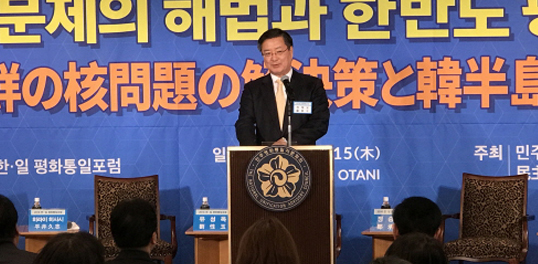Korea-Japan Peaceful Unification Forum held in Tokyo, Japan
Illuminating the circumstances in North Korea, solutions for the North Korean nuclear problem, and plans for developing the Korea-Japan relationship
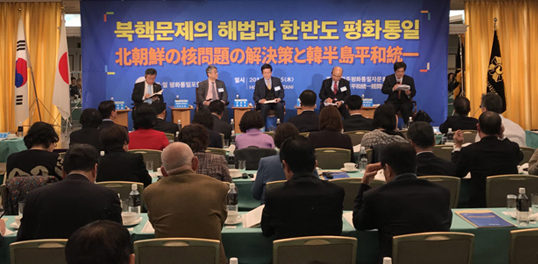
The National Unification Advisory Council (Executive Vice-chairperson Yoo Ho-yeol, Secretary General Kwon Tae-oh) held the Korea-Japan Peaceful Unification Forum on December 15 at 1:00PM at Hotel New Otani in Tokyo, Japan with the topic of “Solutions on the North Korean nuclear problem and peaceful unification in the Korean Peninsula,” by inviting experts from Korea and Japan.
The day's forum, which was hosted under the management of NUAC Japan Assembly (Vice-chairperson Oh Gong-tae, leader of the Korean Residents Union in Japan), was attended by Lee Joon-gyu, South Korea's ambassador to Japan, and Akihisa Nagashima, member of the House of Representatives of Japan with the Democratic Party of Japan, who gave words of greeting, and Professor Hong Kyu-dok of Department of Political Science & International Relations of Sookmyung Women's University and Professor Hajime Izumi of the Institute for International Strategy, Tokyo International University, presided Sessions 1 and 2.
In his opening speech, Secretary General Kwon Tae-oh remarked that, "The crisis in the Korean Peninsula, which occurred by consecutive nuclear and missile provocations by North Korea, greatly intensified the anxiety of Korea and Japan, international society, as well as the countries surrounding the Korean Peninsula including China and Russia." He emphasized that, “the US-Korea-Japan cooperation, especially between Korea and Japan, is critical in order to solve the problems in Northeast Asia including the Korean Peninsula, and communication and cooperation in various fields, including national security, are required between Korea and Japan.”
Secretary General Kwon also remarked that, "Only the complete settlement of the North Korean nuclear problem can bring permanent peace and stability in Northeast Asia and consistent development of countries in the region," and expressed that, "I hope that, in this forum, specific suggestions for cooperation between the two countries will be discussed based on common recognition of a solution for the North Korean nuclear problem.”
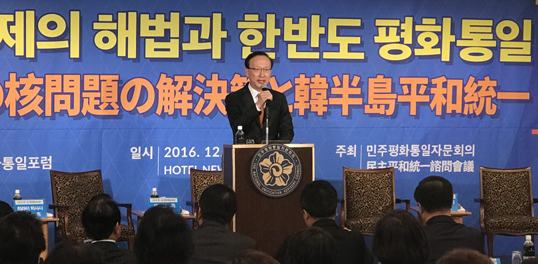
Hyun In-taek
In his keynote speech, Hyun In-taek, former Minister of Unification, remarked that, "North Korean nuclear development is going beyond Stage 9 and is entering the stage of completion. At this point where the Kim Jong-un regime has no intention of stopping its greed on nuclear development, there is no titleernative other than the pressure policy on North Korea." He added that, "Close cooperation among Korea, US, and Japan, is the last hope for solving the North Korean nuclear problem.”
Still, he conveyed that, "The future of solving the North Korean nuclear problem is not so optimistic," pointing out that, "The lukewarm attitude of China on North Korean sanctions is raising the uncertainty in solving the North Korean nuclear problem."
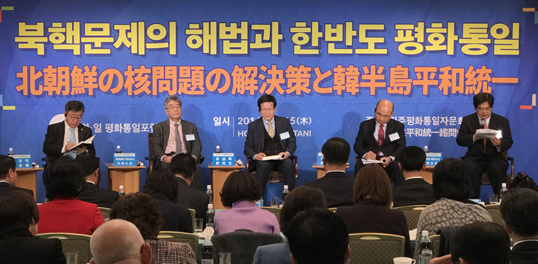
In Session 1, which was conducted under the topic of “North Korean nuclear and missile development and the circumstances in the Korean Peninsula,” Professor Hong Kyu-dok of Sookmyung Women's University hosted the session where Yoo Sung-ok, President of Gyeongnam Development Institute (former President of the Institute for National Security Strategy), and Professor Kimiya Tadashi of Tokyo University gave keynote speeches. Jeong Seung-jo, former Chairman of the Joint Chiefs of Staff, and Hirai Hisashi, visiting an editorial writer of Kyoto News Services, participated as panelists to express their opinions.
 Yoo Sung-ok, President of Gyeongnam Development Institute, who gave a speech in Session 1, remarked that, "Kim Jong-un's ‘nuclear supremacy,’ which is called the parallel route of economy and nuclear weapon, is a policy that has no possibility of success,” adding that, "going after nuclear weapons will ultimately lead to the 'trap of nuclear weapons' where it will hinder economic development, making the original intention of North Korea for going through the parallel route of economic development and reinforcement of nuclear power an unfeasible plan."
Yoo Sung-ok, President of Gyeongnam Development Institute, who gave a speech in Session 1, remarked that, "Kim Jong-un's ‘nuclear supremacy,’ which is called the parallel route of economy and nuclear weapon, is a policy that has no possibility of success,” adding that, "going after nuclear weapons will ultimately lead to the 'trap of nuclear weapons' where it will hinder economic development, making the original intention of North Korea for going through the parallel route of economic development and reinforcement of nuclear power an unfeasible plan."
As the reasons for North Korea obsessing over nuclear missile development after the Kim Jong-un regime came to power, President Yoo analyzed that North Korea intends to solidify the Kim Jong-un regime, offset the inferiority in the competition of tradition weapons with South Korea, and create a asymmetrical military power structure through nuclear armament. Also, regarding its relationship with the United States, North Korea aims to make negotiations with the new administration of the United States by “freezing” nuclear weapons and missile development while solidifying a firm status as a country possessing nuclear weapons.
Regarding the circumstances in North Korea, President Yoo viewed that, "The rule of extreme terror, represented by the execution of Jang Sung-taek, is preventing rational national policies from being established and fulfilled, and the inconsistency and inefficiency of the system is intensifying all the more. Unlike the outward stability, the damage and fracture in the North Korean system will continue to be exacerbated."
Also, he remarked that, "Excessive labor exploitation and natural disasters such as flood are increasing the complaints by the residents, worsening the public sentiment," and diagnosed that "no one can be sure that a North Korean Jasmine Revolution will not happen."
 Professor Kimiya Tadashi remarked that, "The self-constraint shown by the Trump regime in the US due to the caring on the alliance as well as the restraint on the North Korean strategy by the US have been removed, producing a possibility of putting up a hard line against North Korea, including limited exercise of militaristic actions," and pointed out that North Korea, which has a limited connection with the US, will have a hard time predicting its actions.
Professor Kimiya Tadashi remarked that, "The self-constraint shown by the Trump regime in the US due to the caring on the alliance as well as the restraint on the North Korean strategy by the US have been removed, producing a possibility of putting up a hard line against North Korea, including limited exercise of militaristic actions," and pointed out that North Korea, which has a limited connection with the US, will have a hard time predicting its actions.
Professor Kimiya Tadashi said that, "The Trump regime is an opportunity as well as a crisis for North Korea." He viewed that, "If the Trump regime becomes inactive in security cooperation between Korea and the US through isolationism, this can serve as an opportunity for North Korea to become liberated from the burden of a ‘solid Korea-US alliance.’ If the regime becomes disinterested in the North Korean nuclear problem, North Korea becomes inevitable in making a fundamental review on its strategy for valuing actions on the United States." Also, he emphasized that, "Regarding the cost on exercising pressure for repressing North Korean nuclear weapons and missile development, Korea and Japan need to show China that they are willing to share the burden with China."
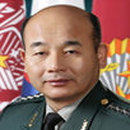 Experts who participated as panelists also emphasized the need to make active response on the North Korean nuclear and missile threat. Jeong Seung-jo, former Chairman of the Joint Chiefs of Staff, emphasized that, "While the nuclear possession of North Korea cannot be acknowledged in terms of politics, we need to repress nuclear use by North Korea under the militaristic premise that North Korea already possesses a certain amount of nuclear weapons." He added that, "North Korean missiles will become a huge threat to not only Korea but to Japan," and that, "It will be very helpful for Korea, the US, and Japan to share information on North Korean missiles."
Experts who participated as panelists also emphasized the need to make active response on the North Korean nuclear and missile threat. Jeong Seung-jo, former Chairman of the Joint Chiefs of Staff, emphasized that, "While the nuclear possession of North Korea cannot be acknowledged in terms of politics, we need to repress nuclear use by North Korea under the militaristic premise that North Korea already possesses a certain amount of nuclear weapons." He added that, "North Korean missiles will become a huge threat to not only Korea but to Japan," and that, "It will be very helpful for Korea, the US, and Japan to share information on North Korean missiles."
 Visiting editorialist Hirai Hisashi remarked that, "North Korea has a false understanding that the North Korean system will be solidified if it acquires a nuclear weapon capable of reaching the East Coast of the US," and pointed out that, "North Korea will not have its system solidified and gain diplomatic superiority even if it possesses 100 ICBM."
Visiting editorialist Hirai Hisashi remarked that, "North Korea has a false understanding that the North Korean system will be solidified if it acquires a nuclear weapon capable of reaching the East Coast of the US," and pointed out that, "North Korea will not have its system solidified and gain diplomatic superiority even if it possesses 100 ICBM."

In Session 2, which was conducted under the topic of “The present and the future of the relationship between Korea and Japan, and North Korean policies of Japan,” Professor Hajime Izumi of the Faculty of Law at Keio University hosted the session where Professor Yoshihide Soeya of the Faculty of Law at Keio University and Jin Chang-soo, President of Sejong Institute gave keynote speeches. Masatoshi Muto, former Japanese ambassador to Korea, and Kim Min-seok, editorialist of JoongAng Ilbo, participated as debaters.
 Professor Yoshihide Soeya remarked that, "The response that the Trump regime will take regarding the Japan-US alliance and Korea-US alliance is very uncertain and flexible," and analyzed that, "Trump might not show much interest in the alliance with Japan and Korea, or take independent actions on the issues of China or North Korea."
Professor Yoshihide Soeya remarked that, "The response that the Trump regime will take regarding the Japan-US alliance and Korea-US alliance is very uncertain and flexible," and analyzed that, "Trump might not show much interest in the alliance with Japan and Korea, or take independent actions on the issues of China or North Korea."
Also, he viewed that the Trump regime might have talks with North Korea, essentially to acknowledge nuclear possession by North Korea, and take ambiguous actions such as searching for new negotiations.
Professor Yoshihide Soeya remarked that, "The birth of the Trump regime may have a possibility of creating a new prospect of cooperation in East Asia by East Asian countries as a result of diplomacy, not with American intentions," and remarked that, "Both Korea and Japan should be keenly aware of such a point."
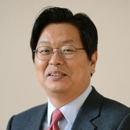 Jin Chang-soo, President of Sejong Institute, remarked that, "If the relationship between the US and China becomes a competition between strong powers, Japan is forecasted to perform East Asian policies that respond to China," and said that, "Strategic talks for cooperation between Korea and China are required to play the role of the catalyst that can mitigate the US-China relationship in a strategic perspective."
Jin Chang-soo, President of Sejong Institute, remarked that, "If the relationship between the US and China becomes a competition between strong powers, Japan is forecasted to perform East Asian policies that respond to China," and said that, "Strategic talks for cooperation between Korea and China are required to play the role of the catalyst that can mitigate the US-China relationship in a strategic perspective."
 Masatoshi Muto, former Japanese ambassador to Korea, analyzed that the factors impeding cooperation among Korea, the US, and Japan include the stance of the Abe regime on security assurance, the lame duck retirement by the Park Geun-hye regime, and the uncertainty of the Trump regime of the US about its stance on Asia, and emphasized that the system of cooperation between Korea and Japan needs to be strengthened.
Masatoshi Muto, former Japanese ambassador to Korea, analyzed that the factors impeding cooperation among Korea, the US, and Japan include the stance of the Abe regime on security assurance, the lame duck retirement by the Park Geun-hye regime, and the uncertainty of the Trump regime of the US about its stance on Asia, and emphasized that the system of cooperation between Korea and Japan needs to be strengthened.
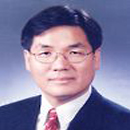 Editorialist Kim Min-seok remarked that, "Prior to completion of ICBM development, Kim Jong-un will first try to target Korea and Japan." He viewed that, "If North Korea loads a nuclear warhead on a Rodong missile, which can threaten Korea and Japan at the same time, it is likely that North Korea will constantly provoke South Korea.”
Editorialist Kim Min-seok remarked that, "Prior to completion of ICBM development, Kim Jong-un will first try to target Korea and Japan." He viewed that, "If North Korea loads a nuclear warhead on a Rodong missile, which can threaten Korea and Japan at the same time, it is likely that North Korea will constantly provoke South Korea.”
Also, providing that this is an idea suggested by the private sector, not confirmed by the Korean government, he brought forth an opinion that, "The Japanese government needs to support strategies for Korea on nuclear options in order to repress North Korean nuclear weapons and missiles."

(From the left) Oh Gong-tae, Vice-chairperson of Japan Assembly and the leader of Korean Residents Union in Japan, Lee Joon-gyu, South Korea's ambassador to Japan, and Akihisa Nagashima, member of the House of Representatives of Japan with the Democratic Party of Japan are giving words of greeting.
Oh Gong-tae, Vice-chairperson of Japan Assembly who gave words of greeting, remarked that, "Denuclearization of North Korea and democratic, peaceful unification ought to be encouraged through stringent response on the North Korean nuclear and missile provocation, supports and reinforcement of cooperation among Korea, the US, and Japan." He added that among the confrontation with organizations that are maintaining communistic ideologies, such as Jochongnyeon (the pro-North Korean residents’ league in Japan), Japan Assembly is engaging in many activities for solidifying the spirit of security and achieving unification."
Also, Vice-chairperson Oh said that, "Korean students who know about 'Jochongnyeon' are not aware of the 'Federation of Korean Residents in Japan'", and pleaded that, "Korean textbooks need to address the backgrounds and activities of the Federation in order to give students a correct understanding of modern and contemporary history."
Lee Joon-gyu, Ambassador Extraordinary and Plenipotentiary to Japan, remarked that, "Korea and Japan are precious neighbors who share core values such as democracy, market economy, and human rights as well as partners for peace and mutual prosperity in the Korean Peninsula and Northeast Asia." He added that, "Korea and Japan are strengthening their efforts with the United States through strong sanctions and cooperation so that North Korea will have no other options but denuclearization."
Akihisa Nagashima, member of the House of Representatives of Japan with the Democratic Party of Japan, remarked that, "In order to achieve denuclearization of North Korea, Korea and Japan need to take leading roles in strengthening the pressing activities on North Korea and surrounding countries." He pointed out that, "In order to achieve this, we must not be bound by past history. Japan is making all-out efforts regardless of parties for the sake of recovery and development of the Korea-Japan relationship."
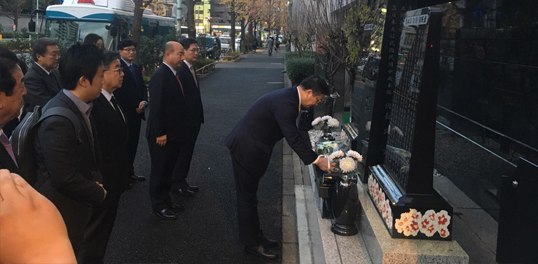
Prior to Korea-Japan Peaceful Unification Forum, Secretary General Kwon Tae-oh and Korean panels visited the Federation of Korean Residents in Japan and paid their respects to Memorial Tower.



 Yoo Sung-ok, President of Gyeongnam Development Institute, who gave a speech in Session 1, remarked that, "Kim Jong-un's ‘nuclear supremacy,’ which is called the parallel route of economy and nuclear weapon, is a policy that has no possibility of success,” adding that, "going after nuclear weapons will ultimately lead to the 'trap of nuclear weapons' where it will hinder economic development, making the original intention of North Korea for going through the parallel route of economic development and reinforcement of nuclear power an unfeasible plan."
Yoo Sung-ok, President of Gyeongnam Development Institute, who gave a speech in Session 1, remarked that, "Kim Jong-un's ‘nuclear supremacy,’ which is called the parallel route of economy and nuclear weapon, is a policy that has no possibility of success,” adding that, "going after nuclear weapons will ultimately lead to the 'trap of nuclear weapons' where it will hinder economic development, making the original intention of North Korea for going through the parallel route of economic development and reinforcement of nuclear power an unfeasible plan." Professor Kimiya Tadashi remarked that, "The self-constraint shown by the Trump regime in the US due to the caring on the alliance as well as the restraint on the North Korean strategy by the US have been removed, producing a possibility of putting up a hard line against North Korea, including limited exercise of militaristic actions," and pointed out that North Korea, which has a limited connection with the US, will have a hard time predicting its actions.
Professor Kimiya Tadashi remarked that, "The self-constraint shown by the Trump regime in the US due to the caring on the alliance as well as the restraint on the North Korean strategy by the US have been removed, producing a possibility of putting up a hard line against North Korea, including limited exercise of militaristic actions," and pointed out that North Korea, which has a limited connection with the US, will have a hard time predicting its actions.  Experts who participated as panelists also emphasized the need to make active response on the North Korean nuclear and missile threat. Jeong Seung-jo, former Chairman of the Joint Chiefs of Staff, emphasized that, "While the nuclear possession of North Korea cannot be acknowledged in terms of politics, we need to repress nuclear use by North Korea under the militaristic premise that North Korea already possesses a certain amount of nuclear weapons." He added that, "North Korean missiles will become a huge threat to not only Korea but to Japan," and that, "It will be very helpful for Korea, the US, and Japan to share information on North Korean missiles."
Experts who participated as panelists also emphasized the need to make active response on the North Korean nuclear and missile threat. Jeong Seung-jo, former Chairman of the Joint Chiefs of Staff, emphasized that, "While the nuclear possession of North Korea cannot be acknowledged in terms of politics, we need to repress nuclear use by North Korea under the militaristic premise that North Korea already possesses a certain amount of nuclear weapons." He added that, "North Korean missiles will become a huge threat to not only Korea but to Japan," and that, "It will be very helpful for Korea, the US, and Japan to share information on North Korean missiles." Visiting editorialist Hirai Hisashi remarked that, "North Korea has a false understanding that the North Korean system will be solidified if it acquires a nuclear weapon capable of reaching the East Coast of the US," and pointed out that, "North Korea will not have its system solidified and gain diplomatic superiority even if it possesses 100 ICBM."
Visiting editorialist Hirai Hisashi remarked that, "North Korea has a false understanding that the North Korean system will be solidified if it acquires a nuclear weapon capable of reaching the East Coast of the US," and pointed out that, "North Korea will not have its system solidified and gain diplomatic superiority even if it possesses 100 ICBM."
 Professor Yoshihide Soeya remarked that, "The response that the Trump regime will take regarding the Japan-US alliance and Korea-US alliance is very uncertain and flexible," and analyzed that, "Trump might not show much interest in the alliance with Japan and Korea, or take independent actions on the issues of China or North Korea."
Professor Yoshihide Soeya remarked that, "The response that the Trump regime will take regarding the Japan-US alliance and Korea-US alliance is very uncertain and flexible," and analyzed that, "Trump might not show much interest in the alliance with Japan and Korea, or take independent actions on the issues of China or North Korea." Jin Chang-soo, President of Sejong Institute, remarked that, "If the relationship between the US and China becomes a competition between strong powers, Japan is forecasted to perform East Asian policies that respond to China," and said that, "Strategic talks for cooperation between Korea and China are required to play the role of the catalyst that can mitigate the US-China relationship in a strategic perspective."
Jin Chang-soo, President of Sejong Institute, remarked that, "If the relationship between the US and China becomes a competition between strong powers, Japan is forecasted to perform East Asian policies that respond to China," and said that, "Strategic talks for cooperation between Korea and China are required to play the role of the catalyst that can mitigate the US-China relationship in a strategic perspective."  Masatoshi Muto, former Japanese ambassador to Korea, analyzed that the factors impeding cooperation among Korea, the US, and Japan include the stance of the Abe regime on security assurance, the lame duck retirement by the Park Geun-hye regime, and the uncertainty of the Trump regime of the US about its stance on Asia, and emphasized that the system of cooperation between Korea and Japan needs to be strengthened.
Masatoshi Muto, former Japanese ambassador to Korea, analyzed that the factors impeding cooperation among Korea, the US, and Japan include the stance of the Abe regime on security assurance, the lame duck retirement by the Park Geun-hye regime, and the uncertainty of the Trump regime of the US about its stance on Asia, and emphasized that the system of cooperation between Korea and Japan needs to be strengthened. Editorialist Kim Min-seok remarked that, "Prior to completion of ICBM development, Kim Jong-un will first try to target Korea and Japan." He viewed that, "If North Korea loads a nuclear warhead on a Rodong missile, which can threaten Korea and Japan at the same time, it is likely that North Korea will constantly provoke South Korea.”
Editorialist Kim Min-seok remarked that, "Prior to completion of ICBM development, Kim Jong-un will first try to target Korea and Japan." He viewed that, "If North Korea loads a nuclear warhead on a Rodong missile, which can threaten Korea and Japan at the same time, it is likely that North Korea will constantly provoke South Korea.”

